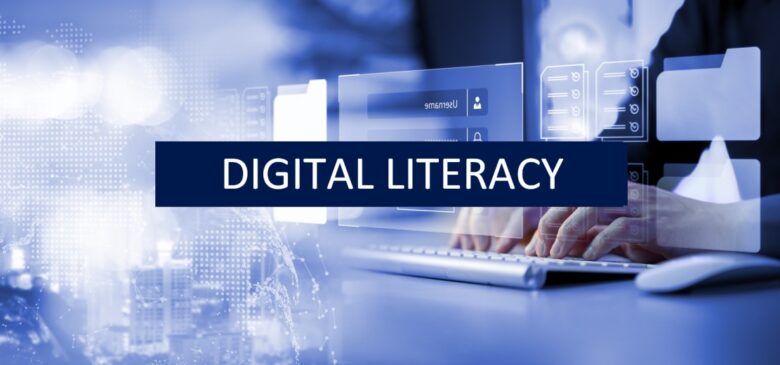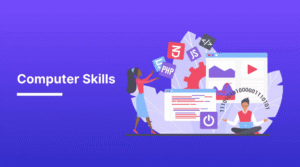In our rapidly changing society, digital literacy is as important as reading and writing. From mobile phones to online banking, digital technology is inextricably linked to every aspect of our lives. Therefore, it is crucial to know how to use the internet safely and effectively. Digital literacy is more than just knowing how to use a computer; it also includes the ability to use digital tools correctly to learn, create, and communicate with others. It enables people to participate in the digital world, explore opportunities, and protect themselves from online threats. Digital literacy connects technology with human knowledge and makes life more efficient, more informed, and safer.
What is Digital Literacy?
Digital literacy refers to the ability to use digital devices, technology, and the internet to search, analyze, consume, share, and create content. It encompasses many skills, such as using search engines correctly, understanding digital ethics, finding reliable online sources, and tracking your digital identity. Digital literacy involves learning how to use technology safely and how to grow personally, academically, and professionally. Simply knowing how to use a device isn’t enough; you also need to be able to think critically, stay up-to-date, and make safe and ethical decisions online.
How Digital Literacy Is Evolving:
The concept of digital literacy has evolved significantly over the past decades. In the early days of the internet, digital literacy meant being able to send emails and browse websites. But as technology advanced, digital literacy expanded to include using social media, understanding data protection, and using artificial intelligence (AI). Today, digital literacy encompasses much more than it once did, encompassing topics such as collaboration and online content creation, as well as safe online behavior and responsible digital citizenship. Our understanding and application of digital literacy must evolve with the changing digital world.
The Importance of Digital Literacy in Today’s World:
Digital literacy is essential for learning, working, and communicating. It helps children research more effectively and think critically about what they encounter online at school. It enables employees to access software, maintain records, and collaborate online at work. Digital literacy is especially important for people who use the internet for everyday errands, banking, and communication. Moreover, with the rise of cybercrime, mastering digital skills will help protect personal information and prevent fraud. In short, digital literacy provides people with the tools they need to adapt, stay safe, and make informed choices in an increasingly digital world.
Teaching Digital Literacy:
Digital literacy is becoming increasingly important in schools around the world. Today, schools use technology in the classroom, including online tools for homework, testing, and collaboration. Teachers want their children to be able to use digital tools for creativity and research, preparing them for careers in technology. Digital literacy extends beyond school; it teaches children to be responsible online, respect privacy, avoid plagiarism, and uphold ethical standards in digital environments. Students who learn these skills early on will become good digital citizens and excel in our ever-connected world.
Being Digitally Literate in the Workplace:
In the workplace, digital literacy is no longer an option; it’s a necessity. Most jobs today require some level of technical skills, such as computer use, data analysis, and digital communication. Computer-savvy employees are more efficient, flexible, and valuable to their companies. Companies benefit from teams proficient in using solutions like project management platforms, cloud storage, and cybersecurity systems. As businesses increasingly rely on digital tools, staying up-to-date and improving digital skills is crucial for career development and job security.
The Impact of Digital Literacy on Communication:
Digital literacy has transformed the way people communicate. Thanks to social media, instant messaging, and videoconferencing, communication has become faster, more widespread, and more participatory. However, this convenience also brings challenges, such as misinformation, cyberbullying, and privacy concerns. Being digitally literate means knowing how to communicate with others online in a clear, respectful, and safe way. This means being able to discern the tone of text, track your digital footprint, and verify the authenticity of information before sharing it. Effective digital communication builds trust and respect while simultaneously strengthening personal and professional relationships.
The Relationship Between Digital Literacy and Cybersecurity:
One of the most important aspects of digital literacy is understanding how to secure your computer. Basic digital literacy can help you defend against many online threats, such as phishing, data breaches, and identity theft. Being digitally literate requires understanding the importance of strong passwords, a secure network, and data protection settings. This also means being able to recognize suspicious emails or websites, prevent the disclosure of excessive personal information, and keep software up to date. The first line of defense against cyberattacks is well-informed users. Therefore, digital literacy and cybersecurity education must work together to ensure a safer online experience for everyone.
Digital Literacy and Social Responsibility:
Digital literacy is more than just knowing how to use technology; it also encompasses taking social and ethical responsibilities. Being digitally literate means using digital platforms responsibly, as technology influences people’s beliefs, behavior, and communities. It means respecting the rights of others, avoiding dangerous content, and encouraging positive online interactions. It also means understanding how our digital footprint affects us and contributing to a healthy digital culture. People who can express themselves effectively can make a difference by promoting digital inclusion, checking facts before sharing information, and using technology to improve the world.
How to Use Technology Better:
To use technology better, you need to be curious, practice, and continuously learn. Taking online tutorials, digital workshops, and technical courses will help you learn more and build confidence. It’s also important to stay informed about new technologies, such as artificial intelligence (AI), and how to protect your computer from hackers. Furthermore, responsible online behavior—such as verifying sources, protecting your privacy, and using technology wisely—can help you develop better digital habits. Investing in digital literacy is important for everyone, whether you’re a student, employee, or entrepreneur, because it helps you stay competitive and secure in today’s fast-paced digital world.
The Future of Digital Literacy:
As technology changes, so does digital literacy. With the increasing adoption of emerging technologies like AI, blockchain, and virtual reality, people will need to adapt to the new digital reality. Digital literacy of the future will encompass data ethics, automation, and the impact of new technologies on privacy and employment. To ensure that digital education benefits everyone, governments, schools, and businesses must work together. This method ensures that no one is left behind in the digital revolution. Digital literacy will remain a crucial factor in societal development, new ideas, and global connectivity.
Conclusion:
In today’s environment, access to technology is no longer a luxury; it is a necessity for success and security. It empowers people to use technology intelligently, ethically, and confidently. Digital literacy impacts how we learn, work, communicate, and stay safe. It helps people grow and thrive in a rapidly changing digital world. By teaching people how to use technology, society can bridge the gap between skills and opportunities, making the digital future more open and informed for everyone. Ultimately, understanding and improving digital literacy is essential for progress in the 21st century and beyond.
FAQs:
1. What does digital literacy focus on?
The goal of digital literacy is to teach people how to use digital tools safely, effectively, and responsibly in their daily lives, at school, and at work.
2. How does computer literacy impact students?
Digital literacy helps students conduct research, think critically, and communicate ethically, thus preparing them for computer-related careers.
3. Does digital literacy simply mean knowing how to use a computer?
No, it also means understanding digital ethics, staying safe online, protecting data, and communicating effectively across various digital platforms.
4. Why should adults learn how to use a computer?
Digital literacy can help people obtain better jobs, avoid online risks, and be more productive at work and in their personal lives.
5. What can people do to use technology more effectively?
People can enhance their digital literacy by enrolling in online courses, keeping abreast of the latest technological trends, practicing safe surfing, and actively participating in the digital community.




